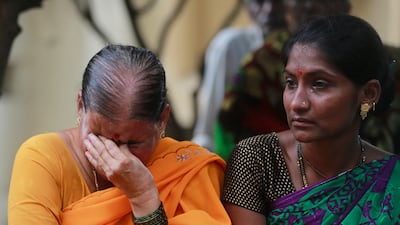Your article, India orders rail station safety checks after 23 are killed in Mumbai (October 1), was sad and painful to read. Elphinstone Road bridge in India's financial capital, Mumbai, was built during the British colonial era and is one-and-a-half centuries old. It has not been maintained properly by the government, which is why it collapsed. Aside from this, the crowds got too big and people were pushing ferociously. Whatever the reason, it is the responsibility of the government to maintain public places to ensure they are safe. Compensation from the government and railway authority won't bring back the victims to their loved ones. I pray for them and for the injured.
K Ragavan, India
Will we wait for mass graves to fill up in Myanmar?
I refer to your article, Rights group accuses Myanmar of crimes against humanity (September 27). Over the past month, unthinkable cruelty has been taking place in Myanmar against the Rohingya. The crimes are an act of genocide. Men and young boys are being burnt alive, women and young girls are being raped and killed in their homes.
This operation is being run by the Myanmar army and local mobs. They are using the excuse of safety and security to block journalists and outsiders from entering Rakhine state in order to execute their brutal operation and exterminate the Rohingya.
The army have burned and destroyed village after village, forcing thousands to flee. Among the more than half a million people who have poured into Bangladesh, people forget that thousands from among them are orphans. Was this barbaric operation against a helpless ethnic minority in response to Kofi Annan's recommendation to the United Nations declaring that this minority have a right to live in their motherland with equal rights and dignity?
What now? Perhaps we will see a few notorious generals and gang leaders convicted of crimes against humanity. I urge the UN to immediately investigate before the Myanmar army creates confusion and covers up its horrific crimes. Why can't the so-called civilised world stop or prevent these types of heartbreaking crimes against humanity again and again? Why must we repeat Cambodia, Rwanda and Bosnia in Rakhine?
Nokib E Kibria, Canada
London should expel those deemed suspicious
I am writing in relation to Con Coughlin's article, Why does London continue to turn its back on Cairo? (September 28). The writer states that the current UK government "finds it difficult to maintain a constructive relationship". This, in my opinion, is due to the negative stereotypes that Salafi asylum seekers have helped create and who London often finds itself harbouring. It is no wonder that London was hit hard by the very mantra it prides itself on. They have allowed residents of the Muslim Brotherhood to continue residing in the capital. I hope London comes to its senses and realises that healthy relations with Cairo is in the best interest of both parties and that allowing potential criminals to reside in the country won't help matters.
Moe Kasem, Dubai

